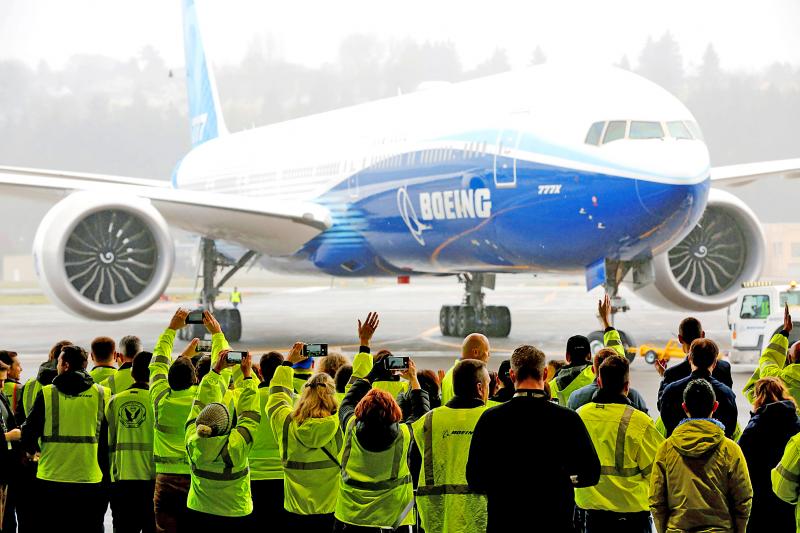Boeing Co’s updated version of the long-haul 777 jet is facing additional testing because of what US regulators called a test-flight incident, and multiple other problems with software and inadequate data.
The US Federal Aviation Administration (FAA) on May 13 wrote a letter to Boeing demanding that the company address multiple shortfalls, including flight-control software that apparently triggered the airplane to move without pilots’ input during a flight in December last year.
“The FAA anticipates a significant impact to the level of regression testing, change impact analysis and the potential to increase the number of certification flight tests that will need to take place,” the letter said.

Photo: Reuters
The letter was written by Ian Won, acting head of the FAA’s division overseeing Boeing.
The FAA said in the letter that it expects certification not to occur until mid-to-late 2023 and the work would take “additional resources” that could hamper other projects with the company.
While the FAA does not set the timing of certification work, relying on companies for that, the letter suggested that the program could face delays.
On Sunday, the agency also said in a statement that it “will not approve any aircraft unless it meets our safety and certification standards.”
The FAA’s letter was earlier reported by the Seattle Times.
“Boeing remains fully focused on safety as our highest priority throughout 777X development,” a Boeing spokesperson said in a statement in response to the letter. “We are working through a rigorous development process to ensure we meet all applicable requirements.”
The broadside by the FAA is the latest in what has been a deteriorating relationship between the US aircraft maker and its US regulator prompted by issues that arose during the grounding of Boeing’s 737 MAX after two fatal accidents.
The FAA had previously begun using its own inspectors to approve newly built single-aisle airplanes and has taken multiple steps to increase oversight of the company.
The FAA highlighted several concerns on the 777X, including a flight-control incident during a test flight on Dec. 8 last year, when the airplane experienced an “uncommanded pitch event,” meaning that the nose of the aircraft rose or fell as a result of the control system.
A similar issue triggered by a malfunction on the 737 MAX pushed down that jet’s nose repeatedly during the two crashes that killed 346 people, prompting a sweeping review of how pilots interact with increasingly computerized flight-control systems. The MAX was grounded for 18 months while it was redesigned.
The agency also told Boeing that a critical avionics system proposed for the airplane did not meet requirements, and expressed concern about proposed modifications involving late changes to software and hardware in the electronics of the jet’s flight controls.
In a hint of broader troubles for the 777X, the FAA said that European regulators are uneasy over parts of the airplane’s design.
“The European Union Aviation Safety Agency has not yet agreed on a way forward on the model 777-9,” the FAA said in the letter.
Postponing the planned market entry of the 777X to late 2023 is the latest in a string of delays for an aircraft originally scheduled to begin commercial service last year.
Emirates president Tim Clark has slammed Boeing for delaying the 777X program and has raised concerns over the model’s performance in desert conditions.

The Eurovision Song Contest has seen a surge in punter interest at the bookmakers, becoming a major betting event, experts said ahead of last night’s giant glamfest in Basel. “Eurovision has quietly become one of the biggest betting events of the year,” said Tomi Huttunen, senior manager of the Online Computer Finland (OCS) betting and casino platform. Betting sites have long been used to gauge which way voters might be leaning ahead of the world’s biggest televised live music event. However, bookmakers highlight a huge increase in engagement in recent years — and this year in particular. “We’ve already passed 2023’s total activity and

Nvidia Corp CEO Jensen Huang (黃仁勳) today announced that his company has selected "Beitou Shilin" in Taipei for its new Taiwan office, called Nvidia Constellation, putting an end to months of speculation. Industry sources have said that the tech giant has been eyeing the Beitou Shilin Science Park as the site of its new overseas headquarters, and speculated that the new headquarters would be built on two plots of land designated as "T17" and "T18," which span 3.89 hectares in the park. "I think it's time for us to reveal one of the largest products we've ever built," Huang said near the

China yesterday announced anti-dumping duties as high as 74.9 percent on imports of polyoxymethylene (POM) copolymers, a type of engineering plastic, from Taiwan, the US, the EU and Japan. The Chinese Ministry of Commerce’s findings conclude a probe launched in May last year, shortly after the US sharply increased tariffs on Chinese electric vehicles, computer chips and other imports. POM copolymers can partially replace metals such as copper and zinc, and have various applications, including in auto parts, electronics and medical equipment, the Chinese ministry has said. In January, it said initial investigations had determined that dumping was taking place, and implemented preliminary

Intel Corp yesterday reinforced its determination to strengthen its partnerships with Taiwan’s ecosystem partners including original-electronic-manufacturing (OEM) companies such as Hon Hai Precision Industry Co (鴻海精密) and chipmaker United Microelectronics Corp (UMC, 聯電). “Tonight marks a new beginning. We renew our new partnership with Taiwan ecosystem,” Intel new chief executive officer Tan Lip-bu (陳立武) said at a dinner with representatives from the company’s local partners, celebrating the 40th anniversary of the US chip giant’s presence in Taiwan. Tan took the reins at Intel six weeks ago aiming to reform the chipmaker and revive its past glory. This is the first time Tan